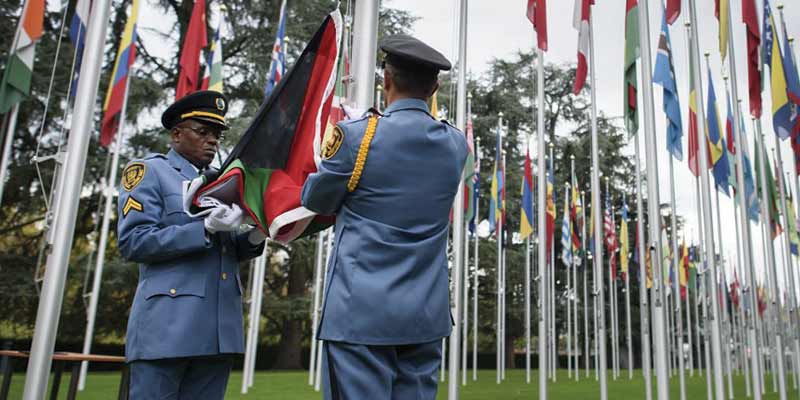- World
- Sep 13
UNGA endorses New York Declaration on Israel-Palestine two-State solution
• India voted in favour of a resolution in the UN General Assembly that endorses the New York Declaration on peaceful settlement of the Palestine issue and implementation of the two-State solution.
• The New York Declaration is the outcome of an international conference held in July at UN Headquarters, organised by France and Saudi Arabia.
• The resolution, introduced by France, was adopted with an overwhelming 142 nations voting in favour, 10 against and 12 abstentions on September 12.
• Israel voted against it, alongside nine other countries — Argentina, Hungary, Micronesia, Nauru, Palau, Papua New Guinea, Paraguay, Tonga and the United States.
• India was among the 142 nations that voted in favour of the resolution titled ‘Endorsement of the New York Declaration on the Peaceful Settlement of the Question of Palestine and the Implementation of the Two-State Solution’.
• The New York Declaration “lays out a single roadmap to deliver the two-State solution”.
• This involves an immediate ceasefire in Gaza, release of all hostages held there, and the establishment of a Palestinian State that is both viable and sovereign.
• The roadmap further calls for the disarmament of Hamas and its exclusion from governance in Gaza, normalisation between Israel and the Arab countries, as well as collective security guarantees.
Israel-Palestine conflict
• Politics, history and religion all place Jerusalem at the centre of the broader Israel-Palestine conflict.
• The status of Jerusalem is one of the biggest obstacles to reaching a peace agreement between Israel and the Palestinians.
• Israel considers Jerusalem its eternal and indivisible capital and wants all embassies based there. Palestinians want the capital of an independent state of theirs to be in the city’s eastern sector, which Israel captured in the 1967 Middle East war and annexed in a move never recognised internationally.
• Violence in the Israeli-Palestinian conflict has intensified since the new government of veteran Prime Minister Benjamin Netanyahu took power in December 2022.
• Israeli-Palestinian violence has surged with frequent military West Bank raids amid a spate of Palestinian street attacks.
• The US-brokered peace talks aimed at establishing a Palestinian state in the West Bank, East Jerusalem and Gaza territories Israel captured in a 1967 war have stalled and show no sign of revival.
What is the two-State solution?
• The idea of establishing one nation each for Jewish and Palestinian populations, living alongside each other in peace, predates the UN’s founding in 1945.
• Drafted and redrafted since then, the concept appears in dozens of UN Security Council resolutions, multiple peace talks and in the General Assembly’s recently resumed tenth emergency special session.
• In 1947, Great Britain relinquished its mandate over Palestine and brought the ‘Palestinian Question’ to the United Nations, which accepted the responsibility of finding a just solution for the Palestine issue.
• The United Nations proposed the partitioning of Palestine into two independent states, one Palestinian Arab and the other Jewish, with Jerusalem internationalised, acting as a framework for the two-State solution.
• A Peace conference was convened in Madrid in 1991, with the aim of achieving a peaceful settlement through direct negotiations along two tracks: between Israel and the Arab States and between Israel and the Palestinians, based on Security Council resolutions.
• In 1993, Israeli Prime Minister Yitzhak Rabin and the Chairman of the Palestine Liberation Organisation Yasser Arafat signed the Oslo Accord, which outlined principles for further negotiations and laid the foundation for a Palestinian interim self-government in the West Bank and Gaza.
• The 1993 Oslo Accord deferred certain issues to subsequent permanent status negotiations, which were held in 2000 at Camp David and in 2001 in Taba, but proved inconclusive.
• Three decades on from the Oslo Accord, the overarching goal of the UN remains supporting Palestinians and Israelis to resolve the conflict and end the occupation in line with relevant UN resolutions, international law and bilateral agreements in pursuit of achieving the vision of two States — Israel and an independent, democratic, contiguous, viable and sovereign Palestinian State — living side by side in peace and security within secure and recognised borders, on the basis of the pre-1967 lines, with Jerusalem as the capital of both States.
What is India’s stand?
India’s policy towards Palestine has been long standing and consistent. The country has supported a negotiated two-State solution, towards establishment of a sovereign, independent and viable State of Palestine within secure and recognised borders, living side by side in peace with Israel.


